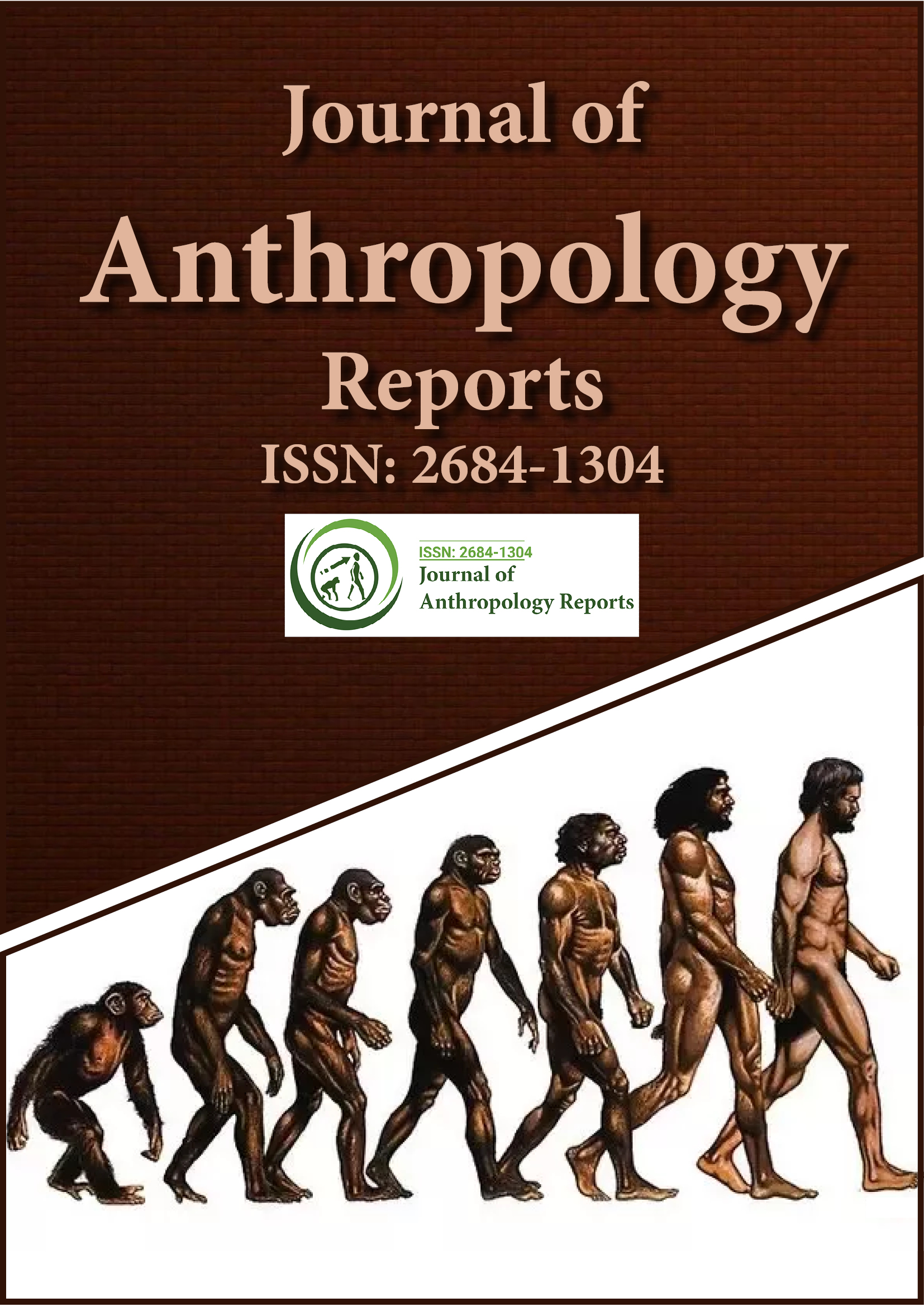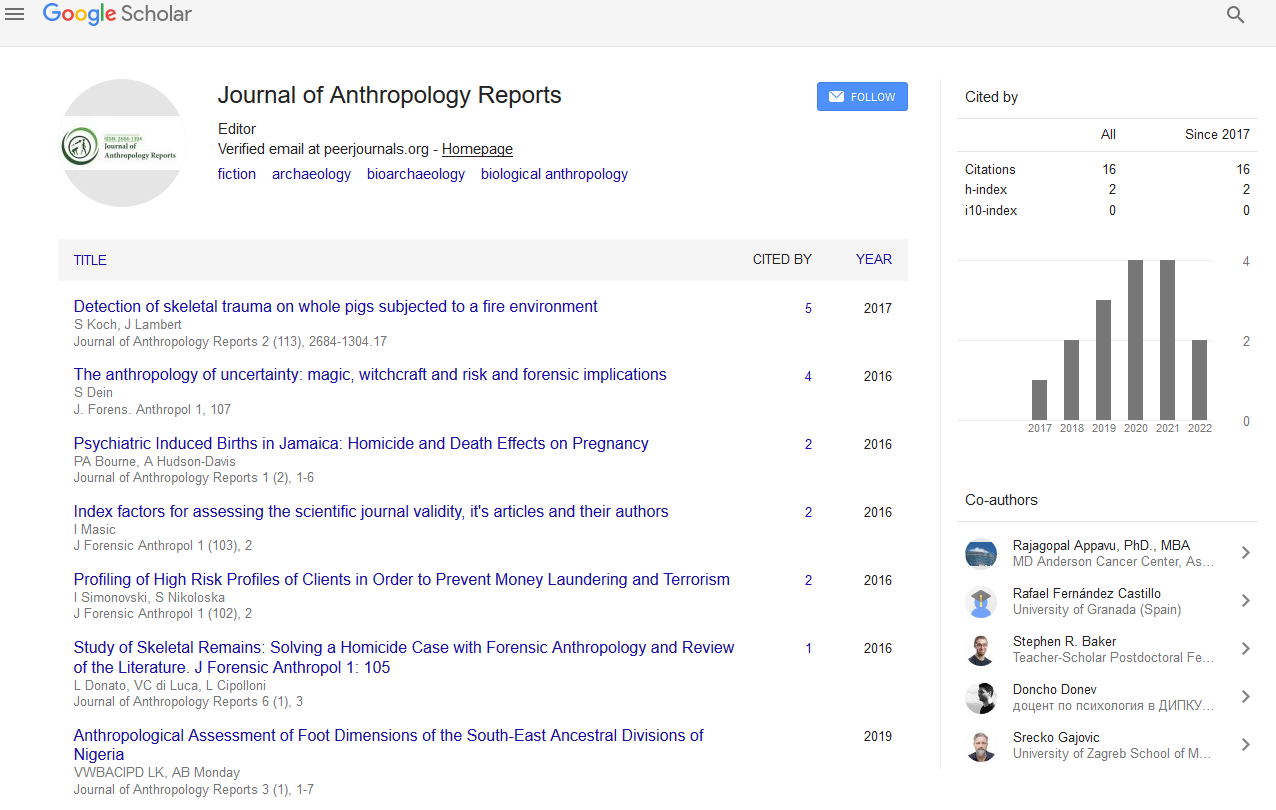Indexed In
- RefSeek
- Hamdard University
- EBSCO A-Z
Useful Links
Share This Page
Journal Flyer

Open Access Journals
- Agri and Aquaculture
- Biochemistry
- Bioinformatics & Systems Biology
- Business & Management
- Chemistry
- Clinical Sciences
- Engineering
- Food & Nutrition
- General Science
- Genetics & Molecular Biology
- Immunology & Microbiology
- Medical Sciences
- Neuroscience & Psychology
- Nursing & Health Care
- Pharmaceutical Sciences
Opinion Article - (2024) Volume 7, Issue 1
Interdisciplinary Insights in Anthropological Inquiry
Benjamin Cross*Received: 05-Mar-2024, Manuscript No. JFA-24-25377; Editor assigned: 07-Mar-2024, Pre QC No. JFA-24-25377 (PQ); Reviewed: 21-Mar-2024, QC No. JFA-24-25377 (QC); Revised: 28-Mar-2024, Manuscript No. JFA-24-25377 (R); Published: 04-Apr-2024, DOI: 10.35248/2684-1304.24.7.189
Description
Anthropology, as a discipline, stands at the crossroads of various fields of study, offering a unique perspective on the complexities of human societies, cultures, and behaviors. In recent years, there has been a growing recognition of the value of interdisciplinary approaches in anthropological inquiry. By integrating insights from diverse fields such as sociology, psychology, environmental studies, and public health, anthropologists can gain a more holistic understanding of the human experience. This article explores the importance of interdisciplinary collaboration in anthropology and highlights its potential to address pressing global challenges.
Anthropology has traditionally been divided into subfields such as cultural anthropology, archaeology, biological anthropology, and linguistic anthropology, each focusing on different aspects of human society and culture. While these subfields offer valuable insights into specific areas of inquiry, they often overlook the interconnectedness of human phenomena. Interdisciplinary approaches, on the other hand, allow anthropologists to bridge disciplinary boundaries and explore the intersections between culture, biology, environment, and society.
One area where interdisciplinary collaboration has been particularly fruitful is the study of environmental anthropology. By integrating insights from ecology, geography, and environmental science, anthropologists can examine the complex relationships between human societies and their natural environments. This interdisciplinary approach is essential for understanding the impact of environmental change on cultural practices, livelihoods, and well-being. For example, anthropologists working in the field of climate change adaptation study how communities around the world are responding to environmental challenges and developing innovative strategies for resilience.
Similarly, interdisciplinary collaboration has enriched research in the field of medical anthropology. By drawing on insights from public health, epidemiology, and social medicine, anthropologists can investigate the social, cultural, and economic factors that shape health outcomes and healthcare practices. This holistic approach is important addressing health disparities and promoting health equity. For instance, anthropologists studying infectious disease outbreaks analyze the social dynamics that influence disease transmission and community responses, helping to inform more effective public health interventions.
Interdisciplinary approaches also offer new perspectives on the study of human evolution and biological diversity. By integrating insights from genetics, paleoanthropology, and primatology, anthropologists can resolve the complex processes that have shaped the evolution of our species. This interdisciplinary approach has led to innovative discoveries, such as the identification of ancient DNA and the reconstruction of human migration patterns. Moreover, interdisciplinary collaboration is essential for understanding the social and cultural dimensions of human evolution, including the origins of language, art, and symbolic behavior.
In addition to advancing our understanding of the past and present, interdisciplinary collaboration in anthropology has the potential to inform policy and practice. By synthesizing insights from multiple disciplines, anthropologists can develop evidence based recommendations for addressing pressing global challenges, from poverty and inequality to environmental degradation and public health crises. For example, interdisciplinary research on sustainable development examines how social, economic, and environmental factors interact to shape development outcomes, informing policies and interventions aimed at promoting human well-being while preserving planetary health.
Despite its many benefits, interdisciplinary collaboration in anthropology also poses challenges. Different disciplines often have their own methodologies, theories, and epistemologies, leading to tensions and disagreements. Moreover, interdisciplinary research requires a significant investment of time and resources, as well as strong communication and collaboration skills. However, the rewards of interdisciplinary collaboration such as new insights, innovative solutions, and transformative impact-far outweigh the challenges.
Conclusion
In conclusion, interdisciplinary collaboration is essential for advancing anthropological inquiry and addressing complex global challenges. By integrating insights from diverse fields of study, anthropologists can gain a more holistic understanding of the human experience and contribute to positive social change. As we navigate the complexities of the 21st century, let us embrace the opportunities for interdisciplinary collaboration and work together to build a more sustainable, equitable, and inclusive world.
Citation: Cross B (2024) Interdisciplinary Insights in Anthropological Inquiry. J Anthropol Rep. 7:189.
Copyright: © 2024 Cross B. This is an open-access article distributed under the terms of the Creative Commons Attribution License, which permits unrestricted use, distribution, and reproduction in any medium, provided the original author and source are credited.

